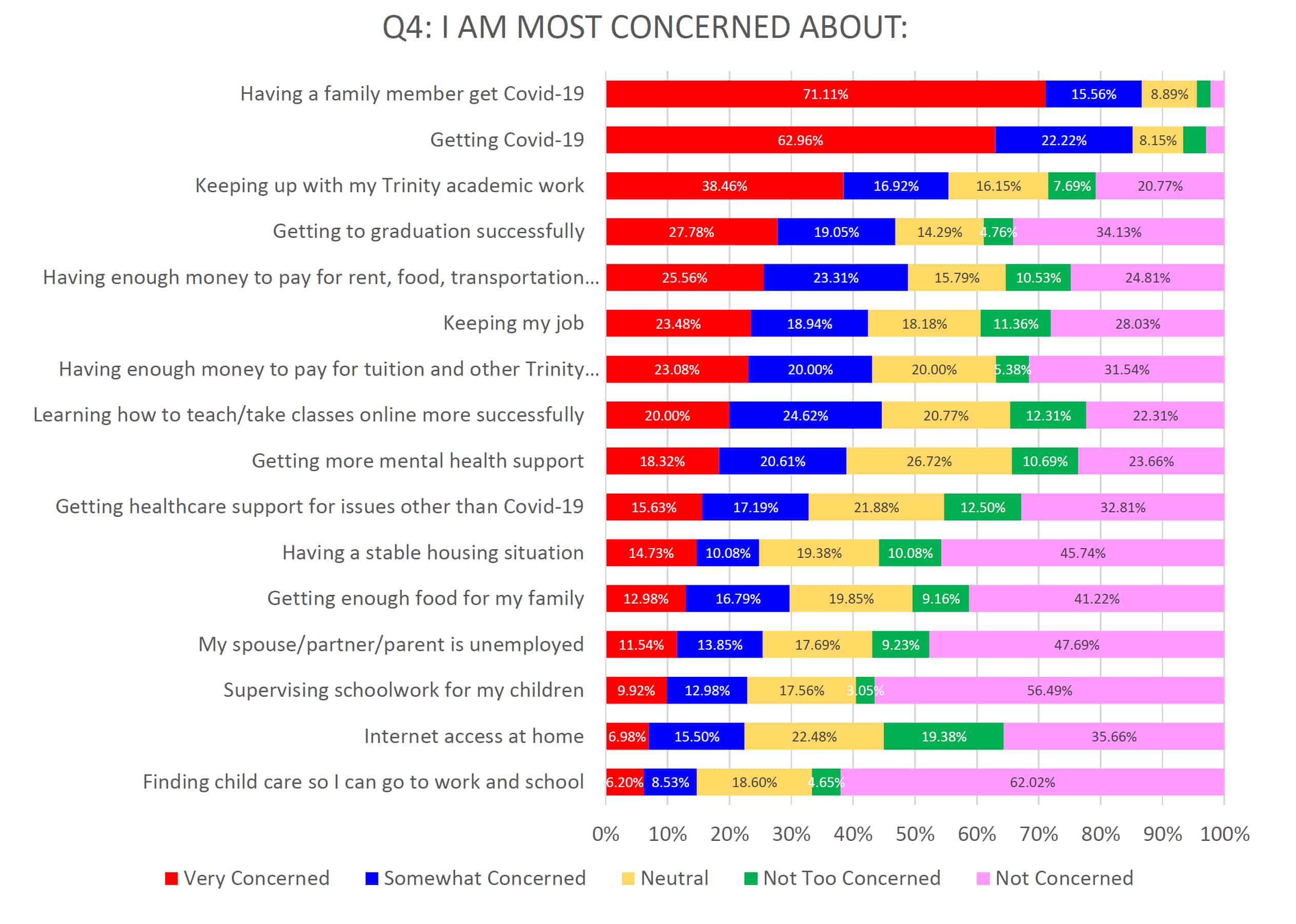
November Community Survey Results
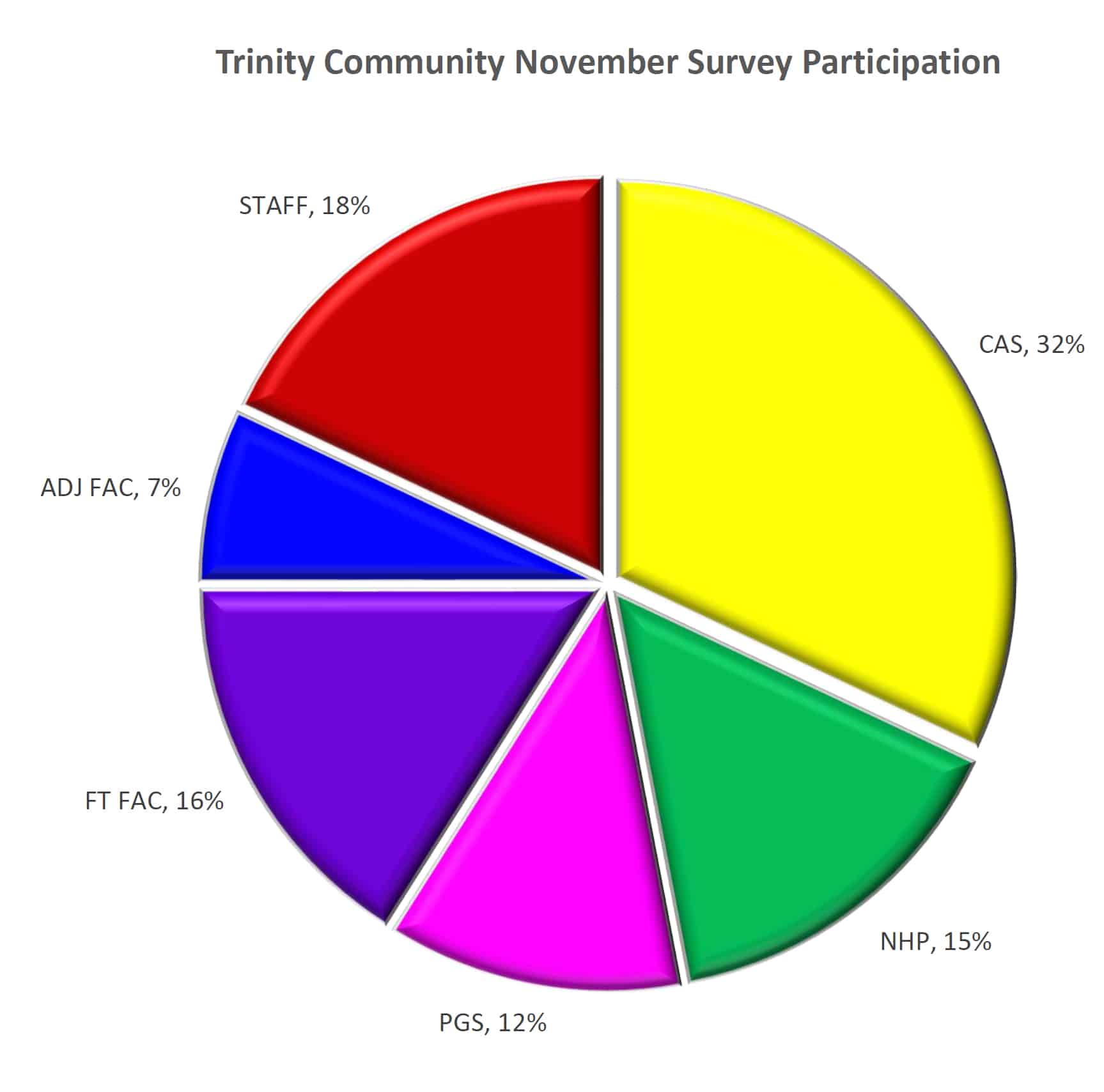
We are taking the final survey of the Fall 2020 semester to gauge how the campus community is faring in the latter weeks of the 2020 pandemic era. This survey compares results from two prior surveys taken in September and October, and also asks some new questions. We are grateful to all who have participated, and there’s still time to take the survey if you have not yet done so. We will discuss these results in the Campus Conversations gathering on zoom on Thursday, December 3 at 4 pm. Somebody asked whether we pay attention to the results of the survey and the answer is Absolutely YES! These surveys have helped us to understand the many challenges that students, faculty and staff are facing and we work on finding solutions to as many of the challenges as possible.
Here are some of the key answers and comments so far:
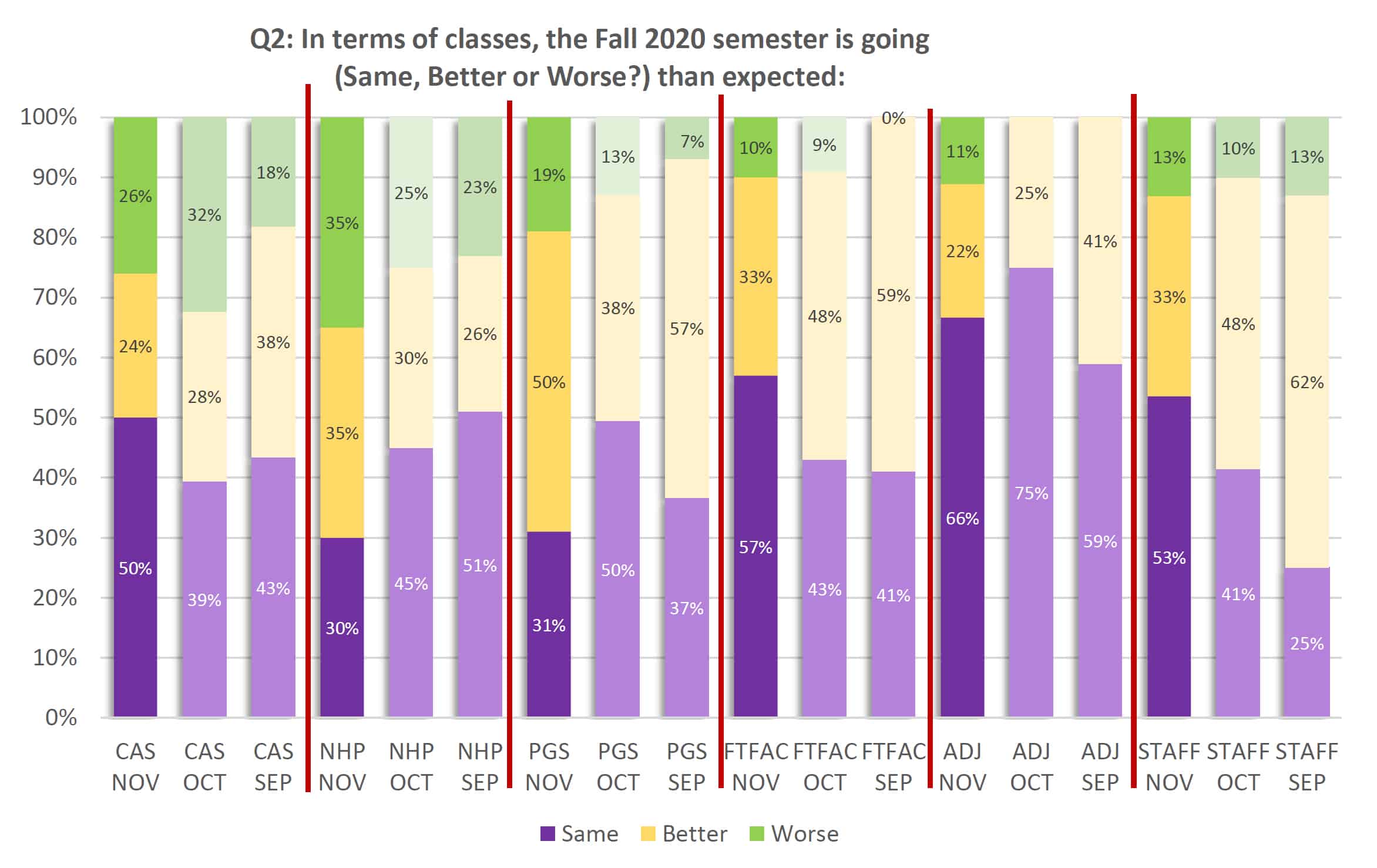
Each month we asked students, faculty and staff to respond to the question of whether the semester was going about as expected, better than expected or worse than expected. This is a very generic phraseology specifically to tease out the general sense of the community and our various constituencies in this most difficult era. What we can see in the results presented above are these issues:
Students generally have a more pessimistic view of how things are going than do faculty or staff, but over time we’ve seen some interesting changes in the various cohorts:
- CAS students started the semester optimistically, took a downturn in October (mid-terms??), but appear to be ending on a more positive note;
- NHP students are expressing deep concerns in this final stretch of the semester, with 35% now saying things are going worse than expected, showing a notable downturn from earlier;
- PGS students also are expressing more concerns although 50% now say things are going “better” than expected;
- Full-time faculty and adjunct faculty remain fairly positive in their outlook, but showing some small concerns;
- Staff also remain generally positive but showing a small downturn.
CAS student comments:
I say better than expected because this all new to us. We’ve haven’t done online schooling and everyone is doing so well. Yes, at first this was something to get used too, but we’ve got it handled.
I started off strong because I knew that all my classes would be online. I prepared myself with getting a planner and large calendar so I won’t miss assignments. My midterm grade from this semester was better than last semester. Though as the ending is coming I am slipping from my strong start.
Online school seemed easy and manageable at first but as time went by it seems that there is more work than anticipated. Balancing more work with my everyday life has become an issue
I have adjusted to the online format better than I anticipated. Professors are still accessible and accommodating. However, I miss the interaction with my fellow students that only the classroom can provide. Often in zoom, people have the option of not being visible via video so all you hear is a voice and that is no fun.
NHP student comments:
I did not expect the work load to be this much. However, I did not expect to be learning so much.
This semester have been extremely exhausting with the amount of work that has been required for just one of my classes. At times I feel that the work consumption is for two classes. It’s been difficult to focus at home since I can’t go to the library as I would normally do. I feel that there is no separation from work, school and home. Since my home occupies all of those domain currently.
I am a graduate student. I am able to focus more on assignments because I no longer have the stress of traveling and spending 1 1/2 hours to and from campus. Also, professors are more willing to meet with you one on one when it is convenient for you. They are becoming more flexible with assignments and are now more understanding if needing an extra day to complete.
My class was able to come into campus for all but one of our planned class sessions. No one was sick as a result of class sessions. That exceeded my expectations – we’re going into a hands on profession, we need hands on training. We also had use of the Sim Lab, which was a fantastic experience. Safety protocols were great between availability of cleaning supplies in all rooms, covid forms at the start of every class session, “pods” per classroom, minimal people on campus.
PGS student comments:
This is my first time taking online classes. I was afraid that I would easily lose focus, due to me not getting in the classroom lectures. However, my professors are understanding and made this semester a breeze. Thank you!
I’ve always been scared that I would never learn anything with virtual learning/ online classes but by my surprise…. I did!
With the situation that we are currently experiencing with COVID-19, and being my first experience as a graduate student, the teachers have been very supportive during this process. I have gained so much knowledge and kills, which I am able to apply to my current role as a Center Director for a child care center in DC.
Faculty comments:
Began semester being mindful of the souls of my students (having personal stressors and anxieties) and adjusting as needed to make sure they learn the content, but they practice selfcare. In order to do this, I also had to be mindful of my needs and how I needed to show up, being prepared emotionally and mentally, to teach and support my students.
Teaching online is going well. My students are actively engaged and express that they like attending class. I checked the stress level before and after Thanksgiving for students to rate their stress level from 0 to 5 (highest). More students were at 3 or lower before the Thanksgiving holiday and higher after Thanksgiving.
Faculty continue to express frustration with the “black box” phenomenon — an issue we’ve discussed several times this semester and will need to resolve for the Spring 2021 semester:
Teaching to “black boxes” is uninspiring and everyone is beyond exhausted.
I am really disappointed in the engagement of students. 95% of them stay blacked out/no camera and it is very difficult to connect with them.
It’s too easy for them to turn off the video and not connect.
Staff comments:
Social isolation and mental health is a major issue for students, which is not surprising, but they have shown a lot of resilience.
Students, faculty, and staff adapted albeit with some struggles. I sense a disconnect at times. I worry the lack of cohesion may impact our programmatic and professional development.
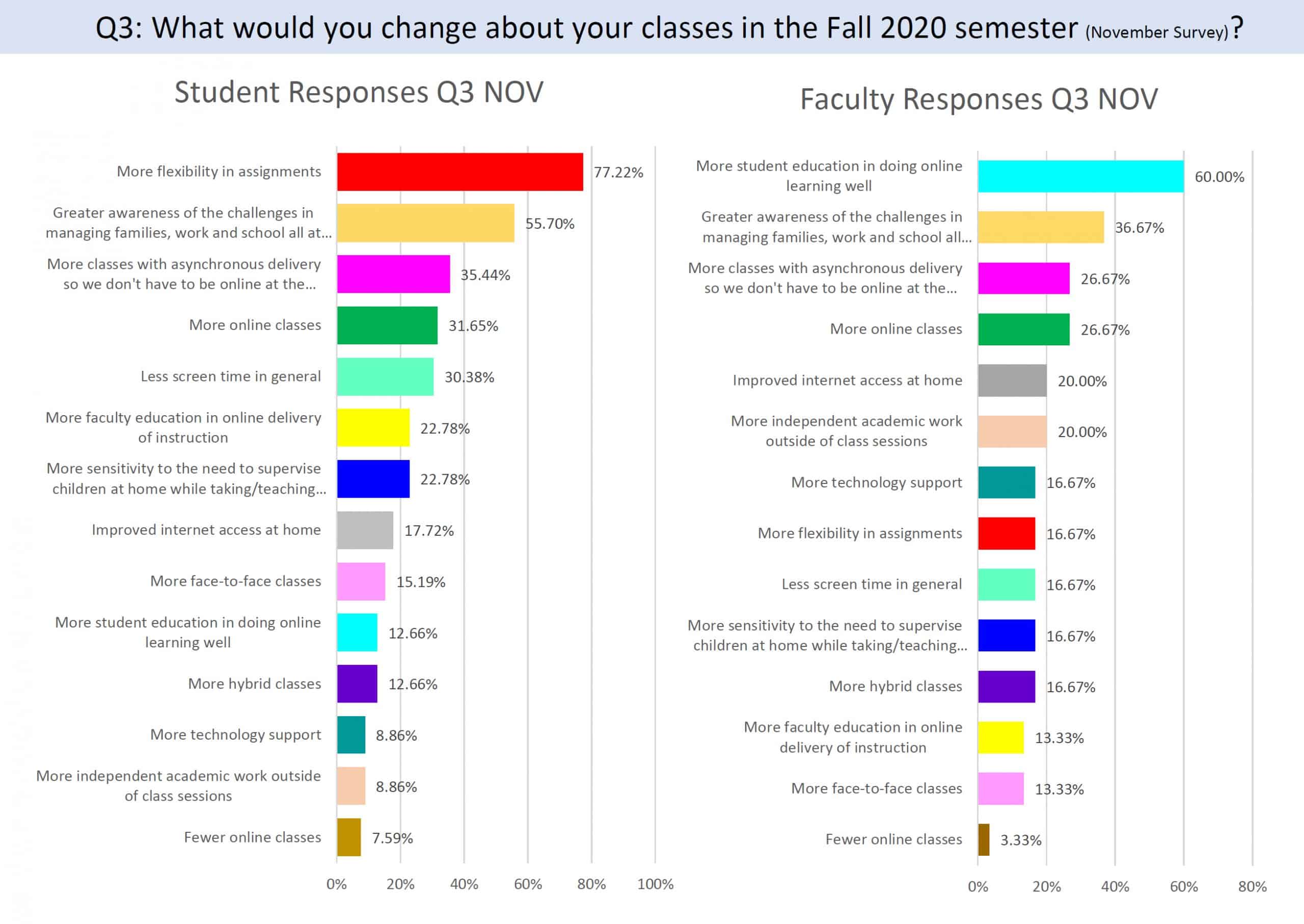
We asked this question in both of the earlier surveys, and the answers at the top of the list are very consistent: students want faculty to be more flexible in giving assignments, a topic that the faculty rate fairly well down the list (77% of students v. 16% of faculty). On the other hand, faculty want students to learn more about how to learn online a topic that is less popular with students (60% of faculty v. 12% of students). There is general agreement about the need for greater awareness of managing Trinity studies and teaching, family responsibilities, other work and the many different life issues that everyone in the community is facing right now.
Lots of comments on this question (to be posted soon, but let’s get to the next question which is very important).

This graphic includes the responses from everyone in the Trinity community, in a subsequent analysis we’ll break out students, faculty and staff, but the responses are quite similar across the groups. The #1 concern of each cohort is the worry that someone in their family will get sick with Covid-19, and that concern shapes much of the response to questions listed below as well. The #2 concern is staying healthy, yourself, and that drives so much of our response these days.
We also need to be mindful of the tremendous other needs that many students have, particularly financially and with life needs. Trinity maintains emergency funds to help students with these needs, support for food and housing issues, and other kinds of support. I urge any student who needs help to contact Dr. Karen Gerlach (gerlachK@trinitydc.edu) or let me know directly (president@trinitydc.edu) — we can help you!
[Note: the comments offered on this question were very personal for most of the respondents, so we are not publishing them here but wish to note that many members of the community express a great deal of stress about finances, and are coping with sickness and death among their families. We will be developing more support services for the community as these conditions continue.]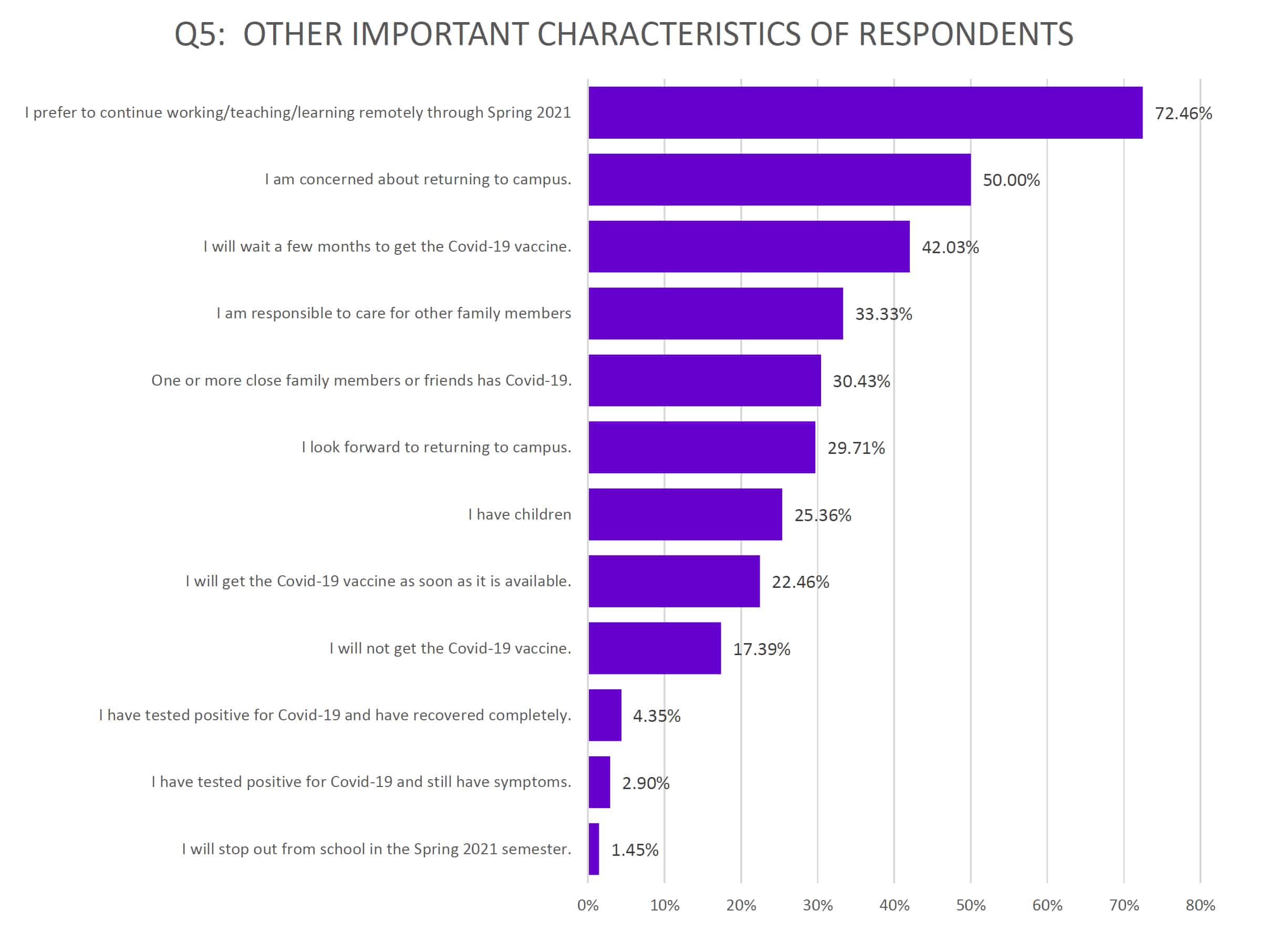
These responses inform our thinking about the Spring 2021 semester and also how we will approach the issue of the Covid-19 vaccine when it becomes available publicly.
Most of the respondents to the survey say that they prefer to continue learning/teaching/working remotely, and our plan for the Spring 2021 semester does continue a largely remote operation, as we have had this fall, with most courses online or hybrid, a few face-to-face conducted very safely. Our staff are rotational in offices with most working remotely several days and no more than 2-3 in any given office suite. Our approach to personnel continues to be that no one is forced to be here, we will accommodate faculty and staff who wish to remain remote. We have the same policy for students, no one is forced to be here. There are some programs, e.g., Nursing and Occupational Therapy, that do require face-to-face instruction for certain courses and clinicals, and students who do not wish to do those components may also need to delay their program completion. But aside from those issues that are accreditation and licensure requirements, we are working as flexibly as possible with everyone.
Our campus environment is very safe. As of this writing (December 2), we have had NO cases of Covid-19 transmission through on-campus contact. We have had 28 members of the campus community test positive since we started tracking in mid-March, and that count is quite low. All of those cases occurred in off-campus transmission and had to follow the quarantine protocols. Similarly, anyone who reports exposure must follow quarantine protocols.
The survey above tells us that some members of the community will be eager to get the vaccine, some will wait, and some say they will not get it. We will be working closely with the DC Department of Health on the vaccine protocols when we know that the vaccine is available, and we will have more on this and Trinity’s policy and practice about vaccines when we know the timetable.
Finally, with all of this very valuable input from our campus community, I am also mindful that some of our Trinity family are suffering a great deal with sickness and deaths in their families. Our hearts go out to all those who have experienced so much loss, and please know that we also want to extend whatever comfort and assistance we might be able to provide. In this season, during which many faith traditions observe solemn rituals as well as festivities, let us offer prayers in whatever language and faith tradition we practice, remembering all those who have died, those who are left behind, those who are sick, and the family members, healthcare workers and others who extend themselves completely to try to care for others. We pray that the blessings of the Trinity will give you strength and hope in the days ahead.